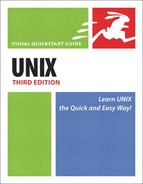| /bin | Essential programs and commands for use by all users. |
| /boot | Files that the system boot loader uses. |
| /dev | Devices (CD-ROM, serial ports, etc.) and special files. |
| /etc | System configuration files and global settings. |
| /etc/skel | Template configuration files for individual users. |
| /etc/X11 | Configuration files and information for the X Window System. |
| /home | Home directories for users. |
| /lib | Essential shared libraries and kernel modules. |
| /mnt | Mount point for temporarily mounted file systems. |
| /opt | Directory for add-on application software packages. |
| /proc | Location of kernel and process information (virtual file system). |
| /root | Home directory for the root user/system administrator. |
| /sbin | Essential programs and commands for system boot. |
| /tmp | Temporary files. |
| /usr/bin | Commands and programs that are less essential for basic Unix system functionality than those in /bin but were installed with the system. |
| /usr/include | Standard include files and header files for C programs. |
| /usr/lib | Libraries for programming and for installed packages. |
| /usr/local | Most files and data that were developed or customized on the system. |
| /usr/local/bin | Locally developed or installed programs. |
| /usr/local/man | Manual (help) pages for local programs. |
| /usr/local/src | Source code for locally developed or installed programs. |
| /usr/sbin | Additional nonessential standard system binaries. |
| /usr/share | Shared (system-independent) data files. |
| /usr/share/dict | Word lists. |
| /usr/share/man | Manual (help) pages for standard programs. |
| /usr/share/misc | Miscellaneous shared system-independent data. |
| /usr/src | Source code for standard programs. |
| /usr/X11R6 | X Window System, Version 11 Release 6. |
| /usr/X386 | X Window System, Version 11 Release 5, on x86 platforms. |
| /var | Changeable data, including system logs, temporary data from programs, and user mail storage. |
| /var/account | Accounting logs, if applicable. |
| /var/adm | Administrative log files and directories. |
| /var/cache | Application-specific cache data. |
| /var/cache/fonts | Locally generated fonts. |
| /var/cache/man | Formatted versions of manual pages. |
| /var/crash | Information stored from system crashes, if applicable. |
| /var/games | Variable game data. |
| /var/lock | Lock files created by various programs. |
| /var/log | Log files and directories. |
| /var/mail | User mailbox files. |
| /var/run | Run-time variable files. |
| /var/spool | General application spool data. |
| /var/spool/cron | Contains cron and at job schedules. |
| /var/spool/lpd | Line-printer daemon print queues. |
| /var/spool/mail | Contains incoming mail for users. |
| /var/state | Variable state information for the system. |
| /var/state/editorname | Editor backup files and state information. |
| /var/state/misc | Miscellaneous variable data. |
| /var/tmp | Temporary files that the system keeps through reboots. |
| /var/yp | Database files that the Network Information Service (NIS) uses. |
